(123 products available)











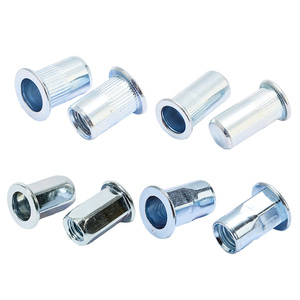

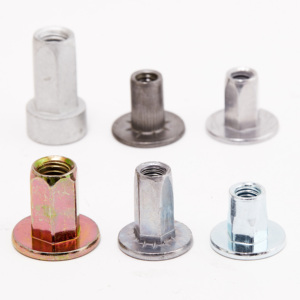

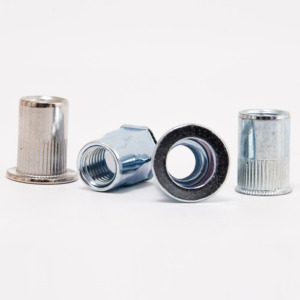
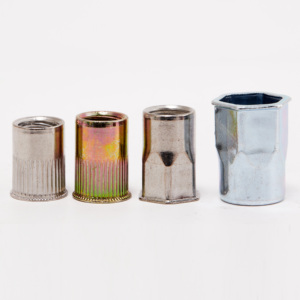



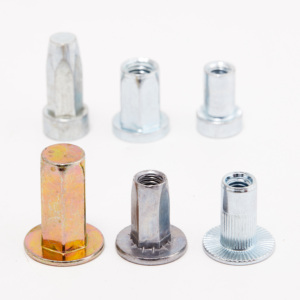
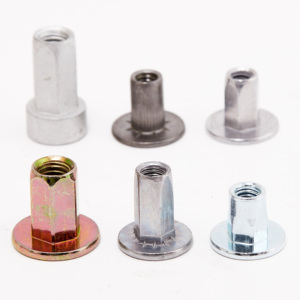

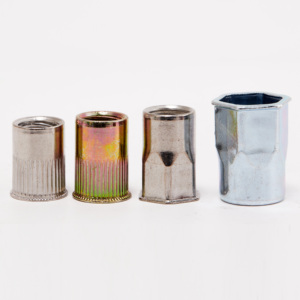











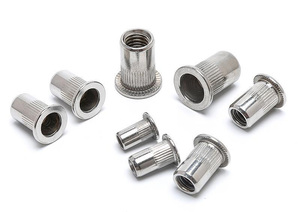



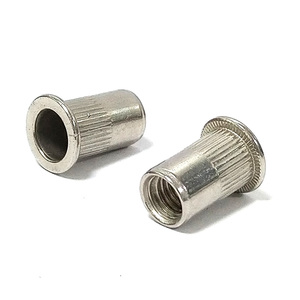
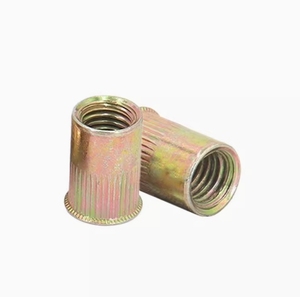



















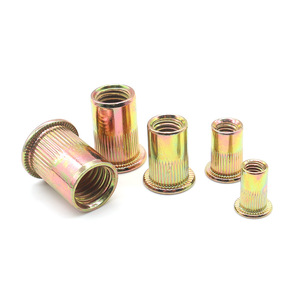


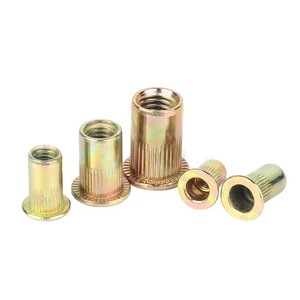
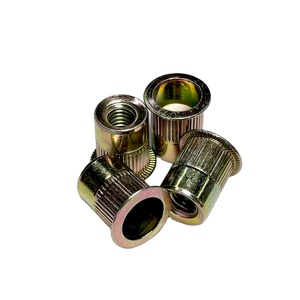

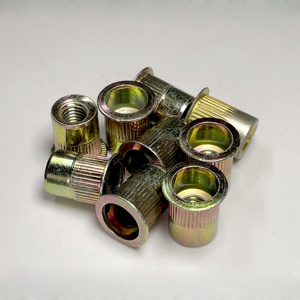
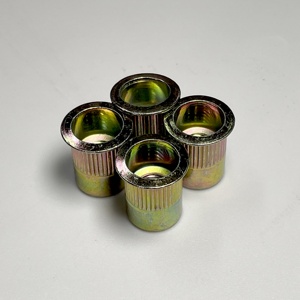



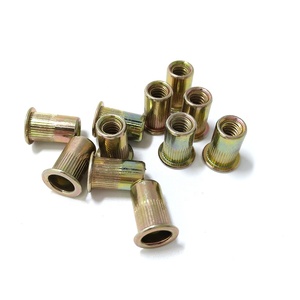


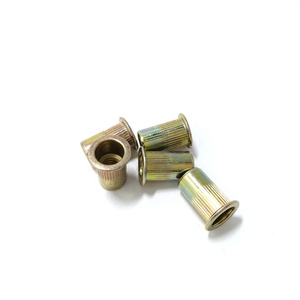




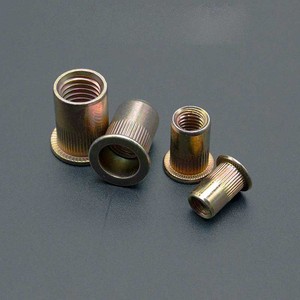


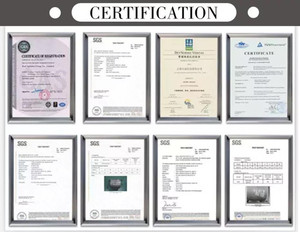

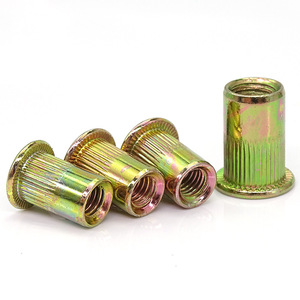












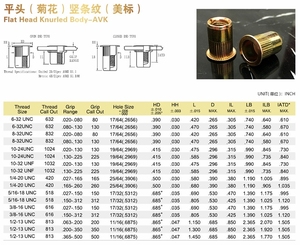
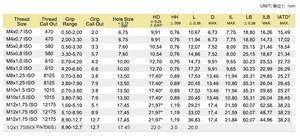
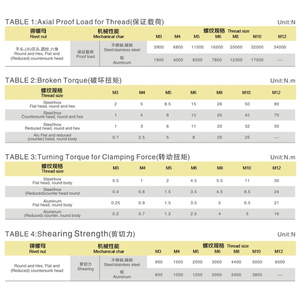







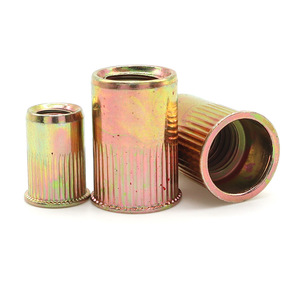



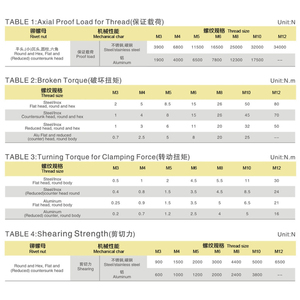
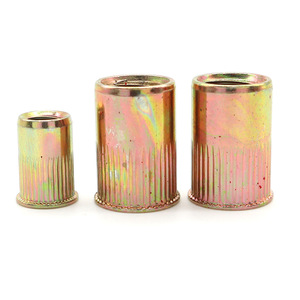




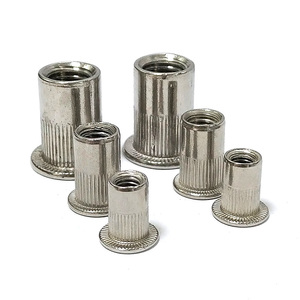


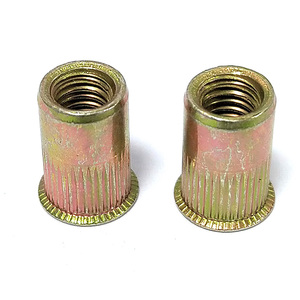
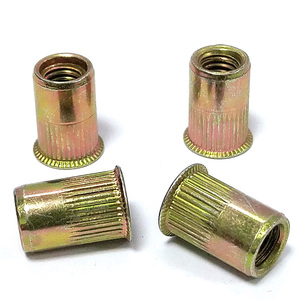







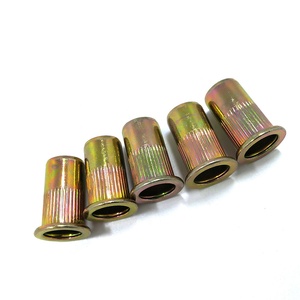












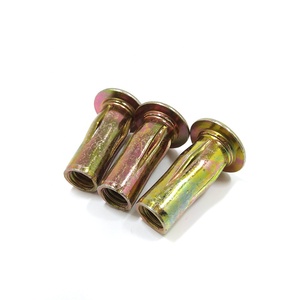
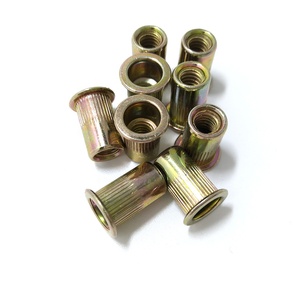

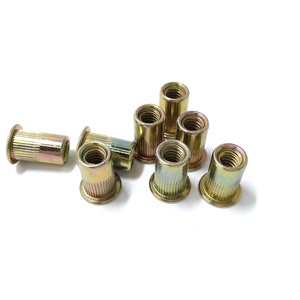
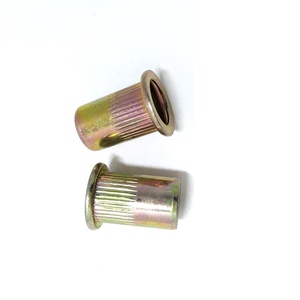



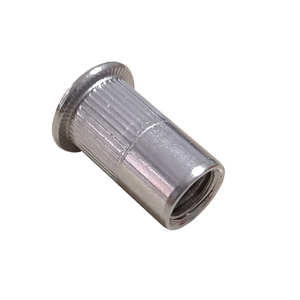
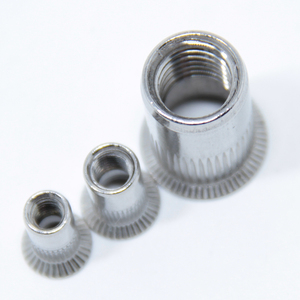
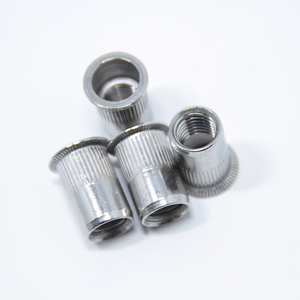

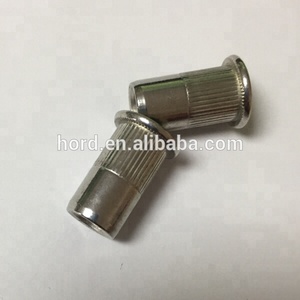






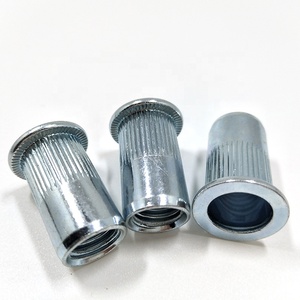


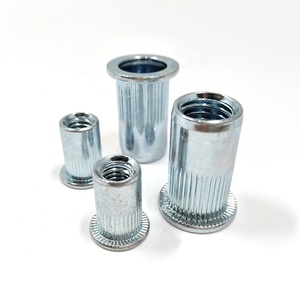

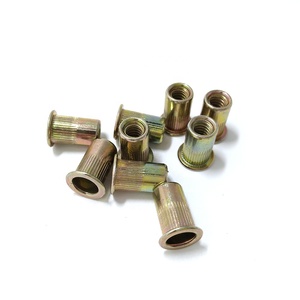





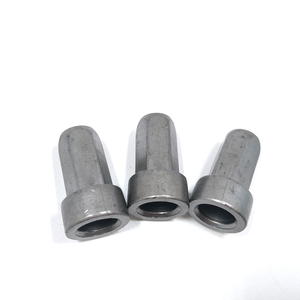







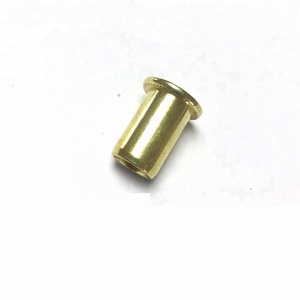



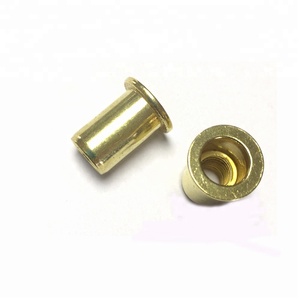



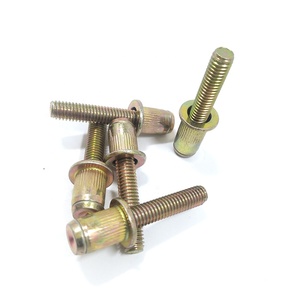

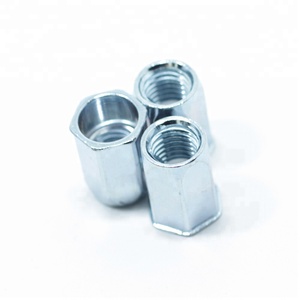
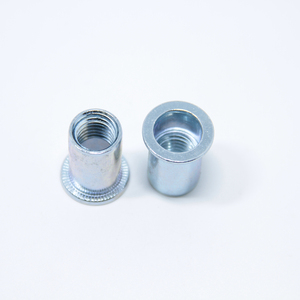






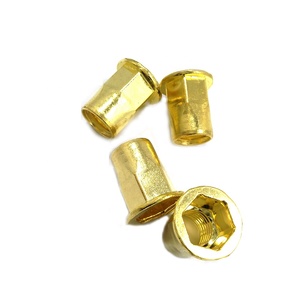


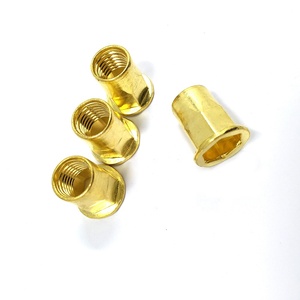

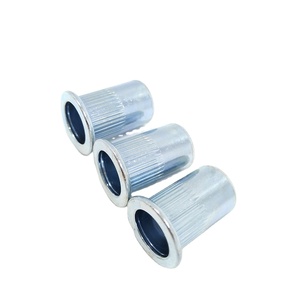




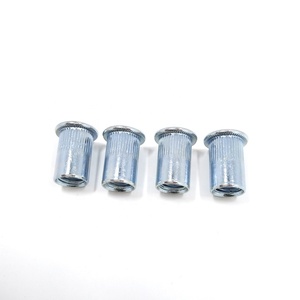





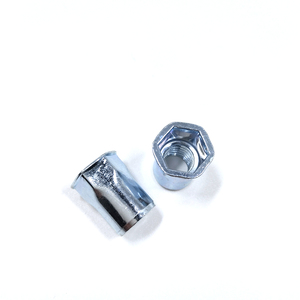


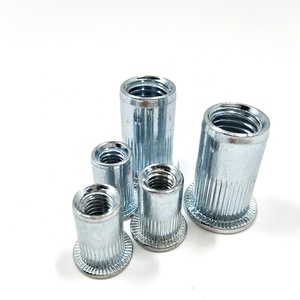

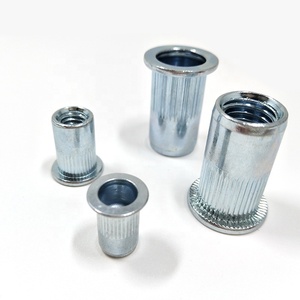
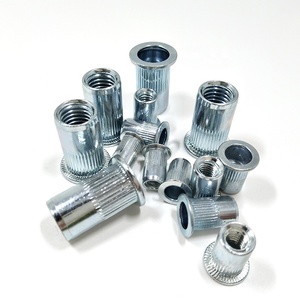






AVK rivet nuts, also identified as threaded insert nuts, are long-bodied fasteners with a normally flared (broad) head that is designed to be installed on one-side of a sheet or thin material.
They are v-shaped and used in applications where a load-bearing threaded hole is needed but access is only available from one-side of the material.
Captive Nut Inserts
These are standard nuts held in place by an adhesive bond or a snap fit into grooves cut into the nut housing. This provides a simple installation and assembly by preventing the nut from falling out when in use or being handled. Captive insert nuts are available in a range of parent material choices like steel, aluminum, plastic, etc., depending on the application requirements.
Tin Rivet Nut
This is a special tin-coated steel rivet nut designed for maximum corrosion resistance. An electroplated tin coating protects the insert from rusting even in high moisture or chemically aggressive environments. The coating is thin yet provides effective shielding against oxidation while adhering to industry standards for environmental protection. Tin-coated steel rivet nuts exemplify durable fastener technology with extended service life in adverse conditions.
Plastic Rivet Nuts
These are lightweight and non-corrosive nuts for applications unsuitable for metal due to insulation needs, weight concerns, or resistance to chemicals and moisture. Commonly employed in automotive interiors and electronic housings, they provide a secure threaded anchor while minimizing electromagnetic interference.
Steel Rivet Nuts
These provide a robust, load-bearing threaded solution for applications requiring high strength and durability. Easily installed in thin materials without access to the backside, they create a secure threaded hole for protruding screws or bolts. Widely used in automotive, aerospace, and industrial engineering.
Aluminum Rivet Nuts
Lightweight yet strong, these offer excellent resistance to corrosion and are ideal for applications in the automotive, aerospace, and marine industries where weight reduction is critical. Easily installed, they provide a secure anchor for screws and bolts in thin materials, making them suitable for joining dissimilar materials.
What is the material of the workpiece?
Choosing a rivet nut material to match the workpiece is vital for ensuring strong bonding. For steel or workpieces with similar density, a rivet nut made from steel is preferred. An aluminum rivet nut is more suitable for lower-density materials like aluminum sheets as it minimizes weight and prevents corrosion if applied to marine or outdoor projects. Plastics are appropriate for delicate or electrically sensitive build models. The Joint material choice protects the joint.
How strong should the rivet nut be?
Considering the required strength should include the load, environment, and application. Steel rivet nuts provide the strongest option ideal for heavy-duty automotive or structural tasks. For moderately strong needs with weight considerations, an aluminum rivet nut suits well. If the application is sensitive to corrosion or chemicals, choose steel by tin coated or plastic rivet nuts. Also, consider the installation surface to adequately match nut material with requirements.
What is the ideal installation method?
Rivet nut installation methods are closely tied to the tools and conditions available. Hand tools like the rivet nut gun are appropriate for small or repair jobs. A hydraulic or pneumatic rivet Nutsetter is better for larger volume inserts or industrial builds. For production spaces, automated methods are justified. Also, consider the thickness and material of the base onto which the nut is being installed so as to achieve the method that is appropriate.
What is the ideal way to determine the hole size?
Correct hole size is keyed to the rivet nut's effectiveness. Always refer to the manufacturer's guidance, where standard hole sizes are defined based on the nut size and type. Properly correlating hole size with nut manufacturer standards avoids installation failure. Using calipers, ensure precise measurement and drilling. Hole size accuracy protects nut performance, material integrity, and bonding strength.
What are the specifications of Avk rivet nuts?
AVK rivet nuts come in various specifications to suit different applications. Key factors include the material (steel, aluminum, plastic), size (diameter and length), and threaded stud (the bolt type, pitch, and length). They also differ in head styles, such as flat, knurled, or slotted, which can affect their gripping performance. Other important specifications are the tensile strength, ultimate strength, and grip range. These depend on the thickness of the material to be fastened). Selecting the right AVK rivet nut for a particular job is crucial. Consider factors such as load-bearing requirements, material compatibility, and environmental conditions.
How to maintain Avk rivet nuts?
AVK rivet nuts do not need much maintenance, mainly when used in fixed applications. Ensuring the installation area remains free of debris, corrosion, or chemical damage goes a long way in preserving their functionality. In high-stress or exposed environments, routine checks for signs of wear or loosening are recommended. It is also important to note that any rusting on the nut or surrounding area tends to decrease fastening performance. Therefore, addressing this issue promptly is important.
How to increase the durability of Avk rivet nuts?
While AVK rivet nuts are incredibly durable, some practices can maximize their lifespan. Using stainless steel or coated rivet nuts in corrosive environments is advisable, as they tend to have more corrosion-resistant properties. Also, using a primer or protective coating on the materials near the nut reduces the chances of rust getting onto the nut. Finally, correctly installing the nut reduces mechanical stress, eventually increasing its durability.
What is the shipping and packing of Avk rivet nuts?
Shipping and packaging AVK Rivet Nuts are crucial to ensure they arrive undamaged and ready for use. They are usually packed in boxes, bins, or containers, depending on the order size and type of the AVK rivet nut. Larger shipments may be containerized for bulk transport, while smaller orders are commonly packaged in cardboard boxes and sent for delivery. During shipment, protect the packaging from moisture, and environmental effects, and ensure rivet nuts are not damaged by applying cushioning materials such as bubble wrap or foam between the nuts. Timely delivery and well-sealed packaging are key to satisfying customers after the product order.
Secure fastened joint
The AVK rivet nuts offer the dual benefit of securely fastening two or more materials and providing a threaded hole. They create a strong joint by spreading the fastening load over a wide area within the material, reducing stress concentration and the likelihood of failure. This is especially true in thin or soft areas, where traditional screws or bolts might pull through.
Insulated joint
AVK rivet nuts are a good joint option in designs where electrical conductivity will be an issue. Usually made of plastic, these nuts form an insulated joint that negatively impacts electrical signals. This property is particularly useful in industries like electronics and telecommunications, where signal interference comes from metal fasteners. Apart from preventing interference, they provide a non-corrosive fastening solution for applications where the metal was exposed to chemically aggressive environments.
Increased load-bearing capacity
Steel AVK rivet nuts have a very high load-bearing capacity compared to conventional screws. Their unique design spreads the load over a wider area, reducing the strength concentration on any single point. This is particularly beneficial for fastened thin sheets or plates in mechanical or structural applications. They are a good option where high tensile or shear forces are present because they ensure the joint will be able to withstand much without failing.
Use in dissimilar materials
AVK rivet nuts provide a secure fastening solution where bonding two different materials are necessary. They are available in various materials, from steel, aluminum, and plastics, which allow for joining dissimilar materials, such as metal to composite or metal to plastic. This flexibility is especially useful in industries like automotive, aerospace, and construction, where weight reduction and increased structural integrity are factors because they deal with different types of materials.
Can be installed from one side
Some applications require a fastener to be installed from one side only. For instance, when fastening two materials together from both sides, access on one side might be difficult. AVK rivet nuts are a good fastener because they can easily be installed from one side, providing much needed convenience and versatility.
A1. An AVK rivet nut is a specialized fastener that combines the properties of a rivet and a nut. It is designed for secure and threaded attachments in thin materials or structures where access is limited to one side.
A2. A rivet is a permanent mechanical fastener often used to join two or more materials together. Rivet nuts, on the other hand, are specially designed nuts. These nuts provide a threaded hole or insert into the material being fastened.
A3. AVK rivet nuts can be manufactured using a variety of materials. They include steel, aluminum, stainless steel, and plastic. Each of these materials have unique properties suitable for specific applications.
A4. Like all metal fasteners, rivet nuts can potentially rust. This is especially true if they are exposed to moisture or oxygen. However, to prevent rusting, rivet nuts are often manufactured using materials like stainless steel.
A5. There are many industries where AVK rivet nuts are used. They include the automotive industry, aerospace and defense, electronics and telecommunications, construction, marine industry, and industrial machinery and equipment.